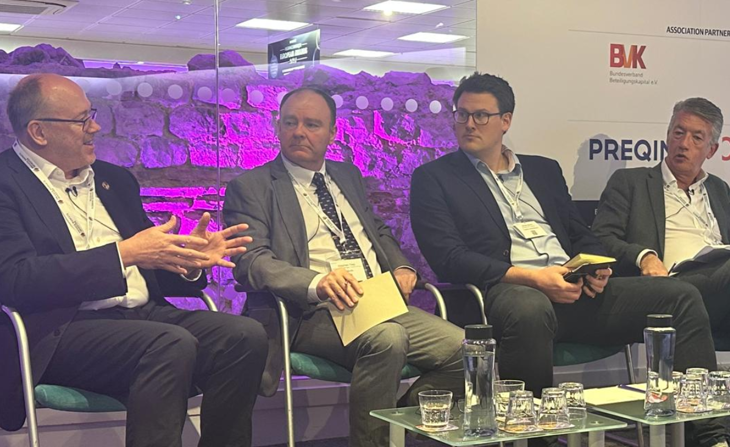
The advent of Long-Term Asset Funds (LTAFs) remained an issue of contention among the participants in the opening panel discussion at the Private Markets Investor | Europe 2024 event in London on Thursday, with the panellists being almost entirely in their favour. However, there was more scepticism from the audience.
The discussion, which was titled “The advent of pension innovations – CDCs, LTAFs, and pension consolidators – and insurance solvency reforms: What is the opportunity and outlook for greater investment in illiquid assets, and what are the operational hurdles?”, focused on prospects for reform and new ideas coming down the pipeline.
Panellists were Mike Chappell, Co-Head of Private Markets at Phoenix Group, Stephen Tiley, Pension Funds Manager and Trustee Director at WHSmith, Bob Tyley, Head of Credit Risk at Hymans Robertson, and James Monk, Investment Director at Fidelity International, and they conferred over the issue in a lively discussion.
Tyley said there were many constraints, but solvency reforms were opening up opportunities – even though they were still only at the proposal stage. “Hopefully in the next few months will find out what the opportunities are,” he said on the first discussion point around the new Solvency UK proposals.
“The next phase of reform could open the gates
but we’re still just playing with the edges."
He added that the insurance side’s big challenge will still be regulation. The reform is “really just tweaking the rules” and a move of the principles. “The next phase of reform could open the gates but we’re still just playing with the edges; yes, [we’re talking about] billions of pounds, but given the size of the market would be great to see hundreds of billions.”
He said it needed more equity investors and the risk model for assets that the regulators must approve, as well as a focus on capital add-ons, which are a “big unknown”, especially whether “the regulator even allows it to go ahead”.
Other panellists were also positive toward the possible effects of Solvency UK reform, and said it would enable a more detailed and thorough way of doing business. “There are some positives in terms of the direction of travel, specifically requirements toward the more nuanced notching,” said Mike Chappell. “We can look at slightly down-risk chain assets, looking to infrastructure where insurance companies are always sluggish, to see if we can effectively allocate capital to investment grade can invest in construction period more productive.”
Overall the panellists were positive about LTAFs and their potential to aid the industry with the things they could offer.
“I do genuinely think LTAFs are a good solution for CDC as the space is innovating rather quickly,” said James Monk. “Platform defaults are the place where things can turn to have scale and manage multi-employer liquidity risks.” However, he added that there needed to be a symbiotic aspect to the LTAF relationship as there was a gap in understanding what Defined Contributions (DC) schemes' needs were in that space.
Several audience questions focused on LTAFs and highlighted potential flaws in the systems of retail savers taking money out too early and other ways that the ‘long-term’ moniker might not be as true as hoped with the current set-up.
“LTAFs need to be in the right place; they currently won’t work
because people transfer out."
Tiley said the industry needed to learn from other markets, embrace more long-term views in these areas, and be more patient. “You don’t dig up the tree to look at the roots every year,” he said. “LTAFs need to be in the right place; they currently won’t work because people transfer out. In the right place, locked away for the long term, they will work, but we don’t have the infrastructure in place currently.”
Audience questions also focused on macro-level concerns and more granular details. The panel was asked if the overabundance of attention toward the energy transition meant LTAFs were not the right fit – especially due to the issues around them being genuinely 'long-term', as well as ‘permitted links’ regulation, which was highlighted as a potential problem area.
“There will be operational issues, inevitably,
but we’re still feeling very positive.”
“We’re keen to move into this sector. We need to do it as an organisation and expand the remit of assets that can put funds into it,” said Chappell, highlighting there was more work to be done to bring LTAFs to the level the industry needed. “How you go through it and how fees are paid will need to be worked through.”
He added: “clearly, there will be operational issues, inevitably, but we’re still feeling very positive.”